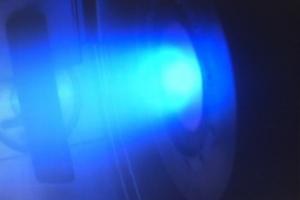Candidate fusion materials to be investigated at Magnum-PSI
At the Dutch Institute for Fundamental Energy Research (DIFFER), the unique experiment Magnum-PSI has produced the first plasma following relocation—a major milestone that opens the way to full scientific operation by the end of the year. Magnum-PSI is the only laboratory setup in the world capable of investigating candidate materials under the realistic conditions for future fusion experiments like ITER.
The first plasma following relocation, achieved on 8 June, is a real accomplishment according to a press release issued by the institute this month requiring many different systems (the plasma source, vacuum pumps, cooling systems and data acquisition, control) to come on line. In the next months the Magnum-PSI team will install diagnostics to monitor plasma conditions and target materials. The experiment will also be connected to the new Ion Beam Facility for (sub)surface materials research that DIFFER is building up.



